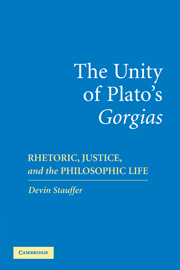Book contents
2 - Polus and the Dispute about Justice
Published online by Cambridge University Press: 30 July 2009
Summary
Let me restate the suggestion with which I concluded the last chapter and say a further word about how it can help us understand the unity of the Gorgias. I have suggested that Socrates is interested in Gorgias as a potential ally. The reference at the beginning of the dialogue to Socrates' lingering in the agora can help us begin to understand Socrates' need for such an ally; later passages, especially in the Callicles section, will help us expand and deepen our understanding. But even if Socrates is in need of an ally with outstanding rhetorical abilities, Gorgias would seem to have proven to be a disappointing candidate. For the result of Socrates' conversation with Gorgias is an impressive Socratic victory that serves not only to impress Gorgias but also to bring out Gorgias' lack of wisdom on a crucial issue. To repeat, Gorgias' boasts about rhetoric and his (genuine) view of the prerequisites of the rhetorical art reveal that he takes justice too lightly. Yet, as I observed, Socrates does not abandon the discussion after Gorgias' defeat, even though he no longer continues to speak with him directly. And I suggested that the continuation of the dialogue may be a continuation of Socrates' conversation with Gorgias, henceforth to be conducted indirectly but nonetheless intended to remedy the flaws in Gorgias' understanding and to continue to lay the foundation for an alliance. In other words, Socrates may not have given up hope in Gorgias.
- Type
- Chapter
- Information
- The Unity of Plato's 'Gorgias'Rhetoric, Justice, and the Philosophic Life, pp. 40 - 81Publisher: Cambridge University PressPrint publication year: 2006



